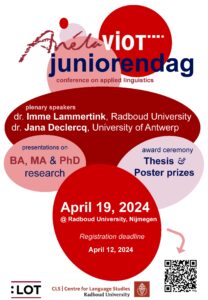U bent hier:: Home > Activiteiten> Juniorendag
33e Anéla-/VIOT Juniorendag▲
 Datum: vrijdag 19 april 2024
Datum: vrijdag 19 april 2024
Locatie: Radboud University Nijmegen, Elinor Ostromgebouw, 1ste verdieping
Keynote sprekers: Imme Lammertink, Myrte Gosen
Download hier het programma (inclusief book of abstracts): Juniorendag_2024_AbstractBooklet
Op vrijdag 19 april 2024 vindt de jaarlijkse Anéla-/VIOT-Juniorendag plaats aan de Radboud Universiteit in Nijmegen. Tijdens de Juniorendag krijgen BA- en MA-studenten, junior-onderzoekers en promovendi op het gebied van toegepaste taalkunde de mogelijkheid om hun werk te presenteren door middel van een mondelinge of een posterpresentatie. Daarnaast wordt er tijdens deze dag de Scriptieprijs uitgereikt aan de beste MA-scriptie op het gebied van toegepaste taalkunde.
Aanmelding
De online registratie is gesloten.
Let op: registreren is nog wel mogelijk op de dag zelf bij de registratietafel.
Voor vragen kun je mailen naar anelaviotjuniorendag@gmail.com.
Bereikbaarheid
Adres
Elinor Ostromgebouw (Radboud Universiteit)
Heyendaalseweg 141
6525 AJ Nijmegen
Nederland
Maps: https://maps.app.goo.gl/3fEJoTxKCvqQr2jy9
Openbaar vervoer
Neem de trein naar station Nijmegen Centraal.
Neem vanaf het station Bus 10 naar de campus (deze vertrekt om de 10 minuten).
Let op: deze bus vertrekt niet vanaf het busstation, maar vanaf een perron schuin voor het station, tussen het Mercure Hotel en het station.
Stap na een rit van ongeveer 7 minuten uit bij halte Erasmusgebouw.
Vanaf hier is het een paar minuten lopen naar het Elinor Ostromgebouw.
Looproute: Loop terug naar de rotonde en sla rechts af. Het is het gebouw aan de linkerkant van de straat. De ingang zit precies onder de plek waar de glazen luchtbrug aan het gebouw vastzit.
Auto
Parkeren is het makkelijkst in parkeergarage Gymnasion, zie: https://www.ru.nl/over-ons/de-campus/gebouwen-en-ruimtes/gymnasion
Dit is betaald parkeren en kost €2,50 per uur, met een maximum van €12,50.
Voor meer informatie, zie: https://www.ru.nl/services/bereikbaarheid-en-parkeren
Commissieleden
Lynn de Rijk (RU) (Voorzitter)
Bram Vertommen (UU) (Senior lid, PR)
Moira van Puyvelde (VU Brussel) (coördinator externe communicatie)
Jikkie van Veen (Erasmus MC) (coördinator externe communicatie)
Margot Vancauwenbergh (Universiteit Antwerpen) (coördinator externe communicatie)
Joyce van Zwet (RU) (coördinator PR)
Melina Pasanikolakis (Universiteit Antwerpen) (coördinator abstracts)
Evi Dalmaijer (RU) (coördinator op locatie)
Sofie van der Meij (RUG) (coördinator programma)
Yan Jia (Maastricht Universiteit) (Penningmeester)
Wieke Harmsen (RU) (coördinator op locatie)
Sponsors:

![]()
